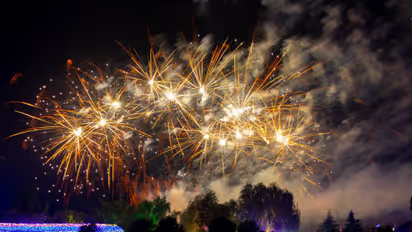Bengaluru air quality improves during Diwali despite Rs 500 crore firecracker sales, fewer vehicles on road

Synopsis
This Diwali, Bengaluru’s air quality improved slightly despite high firecracker sales. With many residents out of town, vehicle traffic, and thus emissions, dropped sharply, leading to lower pollution levels on November 1 and 2. Experts attribute this improvement mainly to reduced vehicular pollution.
This Diwali, Bengaluru's air quality improved slightly, despite a major increase in firecracker sales worth over Rs 500 crore. Surprisingly, on November 1 and November 2, the two main days of the festival, pollution levels in the city were lower than on regular days. The reason? Fewer vehicles on the roads.
With many residents heading out of the city to visit family or go on holiday, traffic across Bengaluru dropped sharply. With offices closed, fewer private vehicles and cabs were on the streets, reducing vehicle emissions, which helped keep the air quality better than expected.
Bengaluru tragedy: Drunken man dies after firecracker injury in Konanakunte; 6 arrested (WATCH)
Before Diwali, the Karnataka State Pollution Control Board (KSPCB) checked air quality in different parts of the city. On October 24 and October 31, the days leading up to the festival, air quality readings showed a slight rise in pollution due to increased activities and firecracker testing.
Kasaragod firecracker explosion: Death toll rises to four after 19-year-old succumbs to burn injuries
On the first day of Diwali, October 31, pollution levels went up slightly, but the increase was smaller than usual for this time of year. With many people out of the city, the decrease in vehicle use helped to limit the impact of firecracker smoke on the city’s air. When KSPCB checked the air quality again on November 1 and November 2, the peak festival days, the results showed a notable improvement, with lower pollution levels than expected.
Officials believe this improvement is mainly due to fewer vehicles on the road, as traffic is typically one of the biggest sources of pollution in Bengaluru. Environmental experts noted that this dip in traffic during Diwali offered a rare chance to see how less vehicle pollution can benefit the city’s air quality.
Stay updated with the Breaking News Today and Latest News from across India and around the world. Get real-time updates, in-depth analysis, and comprehensive coverage of India News, World News, Indian Defence News, Kerala News, and Karnataka News. From politics to current affairs, follow every major story as it unfolds. Download the Asianet News Official App from the Android Play Store and iPhone App Store for accurate and timely news updates anytime, anywhere.